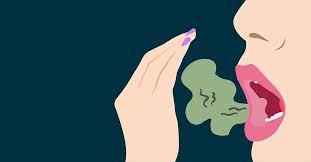Top 5 Remedies for Bad Breath: Freshen Your Smile
8/24/20255 min read


Understanding Bad Breath
Bad breath, clinically known as halitosis, is a common oral health issue that can significantly affect an individual's daily life and social interactions. Understanding its causes is critical for effective management and prevention. Primarily, bad breath originates in the mouth and is often a result of poor oral hygiene practices. When food particles accumulate between teeth and on the tongue, they can foster the growth of bacteria that produce foul-smelling compounds.
Another common trigger for halitosis is the consumption of specific foods, such as garlic, onions, and certain spices, which can leave pungent odors that linger even after brushing. Moreover, acidic foods and beverages can contribute to bad breath as they may alter the oral environment, enhancing the bacteria’s ability to thrive. It is essential to note that some health conditions, including respiratory infections, sinusitis, and even systemic illnesses like diabetes or liver disease, can also result in persistent bad breath.
The presence of bad breath can be detrimental to self-esteem and social confidence. Individuals with this condition may feel embarrassed during conversations, which can affect their interactions and relationships. People often go to great lengths, such as using breath mints or mouthwash, to mask their breath, yet these solutions may only provide temporary relief rather than addressing root causes.
Maintaining fresh breath is crucial for both personal communication and professional situations. Healthy oral care habits, including regular brushing, flossing, and dental check-ups, play a vital role in minimizing the risk of halitosis. Understanding the factors contributing to bad breath is the first step toward effective prevention and treatment.
Top 5 Remedies for Bad Breath
Bad breath, also known as halitosis, is a common condition that affects many individuals at some point in their lives. It can arise from various sources, including poor oral hygiene, certain foods, or underlying health issues. Below are five effective remedies to help combat bad breath and promote a fresh smile.
1. Regular Oral Hygiene: Maintaining a consistent oral hygiene routine is essential for preventing bad breath. Brushing teeth at least twice a day and flossing daily removes food particles and plaque that can cause odor. Using fluoride toothpaste and a soft-bristled toothbrush is recommended for optimal cleaning. Additionally, cleaning the tongue can further eliminate bacteria that contribute to bad breath.
2. Sugar-Free Chewing Gum: Chewing sugar-free gum can stimulate saliva production, which naturally helps in cleansing the mouth. Saliva acts as a natural mouthwash, neutralizing odors and washing away food debris. Look for gum containing xylitol, a natural sweetener that inhibits the growth of bacteria responsible for bad breath.
3. Mouthwash: An antibacterial mouthwash can significantly reduce bad breath by killing odor-causing bacteria. Choosing a mouthwash that contains chlorhexidine or cetylpyridinium chloride can be particularly effective. Regular use, especially after meals, can help keep breath fresh throughout the day.
4. Fresh Herbs: Certain herbs like mint, parsley, and cilantro have natural antibacterial properties and can effectively combat bad breath. Chewing on these herbs or steeping them in hot water to make a tea is a simple and effective remedy. The essential oils present in these plants help mask odors and reduce bacterial growth.
5. Hydration: Drinking plenty of water is vital in maintaining oral health and preventing dry mouth, which can exacerbate bad breath. Staying hydrated flushes out food particles and bacteria, contributing to fresher breath. Aim for at least eight glasses of water a day to support this remedy.
Implementing these remedies can significantly improve oral freshness and diminish instances of bad breath. From maintaining good oral hygiene to utilizing natural herbs, these strategies can help you achieve a more confident and pleasant smile.
Lifestyle Changes for Fresh Breath
Maintaining fresh breath is often a reflection of one’s oral health and lifestyle choices. Incorporating specific lifestyle changes can significantly reduce the occurrence of bad breath, enhancing overall well-being while promoting a confident smile. One of the most essential dietary choices involves limiting food and beverages that are known to exacerbate bad breath, such as garlic, onions, and coffee. Instead, focusing on a diet rich in fruits, vegetables, whole grains, and lean proteins can help keep breath fresh. Crunchy fruits and vegetables, such as apples and carrots, not only aid in cleaning the teeth but also stimulate saliva production, which is vital for neutralizing odors.
Hydration plays a fundamental role in combating bad breath as well. Drinking adequate water throughout the day helps to wash away food particles and bacteria that contribute to unpleasant smells. Dehydration can lead to a dry mouth, which is one of the primary culprits of bad breath. Therefore, keeping a water bottle handy and setting reminders to drink can be an effective way to ensure sufficient hydration. In addition to this, limiting sugary and acidic beverages can also aid in maintaining optimal oral health, thus preventing breath issues.
Oral hygiene routines should not be overlooked in the fight against bad breath. Regular brushing and flossing are imperative, as they remove food debris and plaque that can cause odors. Incorporating tongue scraping into your daily routine can further alleviate bad breath by removing bacteria that accumulates on the tongue's surface. It is also advisable to visit the dentist regularly for professional cleanings and check-ups. By integrating these practical lifestyle changes into everyday life, individuals can effectively combat bad breath and enjoy the benefits of a fresher, healthier smile.
When to Seek Professional Help
Bad breath, clinically termed halitosis, is a common issue that many individuals experience. While occasional bad breath is usually manageable with home remedies, persistent or severe cases may necessitate professional evaluation. Understanding when to seek assistance from a dental professional or healthcare provider is crucial for addressing potential underlying health problems.
Several signs can indicate that bad breath may be more than just a temporary annoyance. If an individual notices that their breath remains consistently foul despite maintaining oral hygiene practices such as regular brushing and flossing, it could be a signal of a more serious condition. Additionally, if bad breath is accompanied by symptoms such as dry mouth, a noticeable flavor in the mouth, or changes in appetite, it is advisable to consult a dentist or doctor. These symptoms may suggest underlying issues, including infections, gastrointestinal disorders, or systemic diseases that require medical attention.
A dental professional can conduct a thorough oral examination, evaluating the teeth, gums, and overall oral environment. They may also review the patient's health history and perform diagnostic tests if necessary. Conditions like gum disease, tooth decay, or oral infections can significantly contribute to bad breath and may require specific treatments ranging from professional cleanings to more advanced dental procedures.
For individuals who have ruled out oral health problems but still suffer from chronic bad breath, seeking a medical opinion is recommended. Conditions such as sinus infections, respiratory tract infections, or metabolic disorders might be influencing the breath odor. In these cases, a healthcare provider can offer guidance on appropriate treatments, which may include antibiotics, lifestyle modifications, or referrals to specialists.
Ultimately, recognizing when to seek professional help for bad breath can lead to better oral health and overall well-being, ensuring underlying issues are addressed promptly.
Essentials
Your guide to men's lifestyle and products.
Reviews
Blog
contact@urbangentlemen.com
© 2025. All rights reserved.
